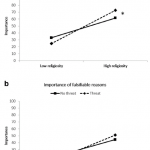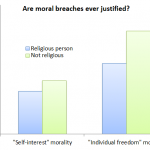Studying links between religious belief and crime is notoriously difficult. On a crude level, people in prisons in the USA are more likely to be religious than the general population.
Of course, there are any number of confounding factors that could be at play here. So you need to look over time to have any hope of working out what is causing what.
So Steven Pirutinsky (Columbia University) took a look at a database of 14-18 years olds from Arizona and Pennsylvania who had committed a serious criminal offence, and were then followed for 7 years.
In regular follow-ups, they were asked about things like how religious they were, and also how many (and what type) of crimes committing crimes.
What he found was not only that personal religiousness was linked to less crime but that short-term changes in religiousness were linked to changes in criminality over the subsequent survey period.
It was a fairly small effect, but it was definitely there.
Even more interesting was that the effect seemed to be mediated by improvements in impulse control.
Impulse control was measured using another questionnaire, that asked questions like ““I say the first thing that comes into my mind without thinking enough about it”; “I do things without giving them enough thought”. The study found that these adolescent’s impulse control tended to increase over time, but that an increase in religiousness was linked to further increases in impulse control and the next survey point.
Now that’s important for two reasons. Firstly, habitual criminals are known to have poor impulse control.
Secondly, others studies have found that religion can increase a closely linked phenomenon, self control (See Religion boosts self control and Can prayer improve your self-control?).
So what we have here is a study that nicely ties together these different strands and provides us for the first time with evidence that an increase in religion can lead to a decrease in criminal activity, at least in these young people who have committed serious crimes.
Now, at the end of the day this is all based on survey data. It is feasible that what we are seeing here is that youngsters who become religious carry on committing crimes but chose not to admit it. It is actually well known that, when surveyed, people tend to give an image of themselves that is what they want to believe about themselves, rather than reality (it’s called Social Desirability Bias).
We can’t be sure that they were honest in their answers.
And it should be remembered that this wasn’t an interventional programme. Nobody preached religion at them. It’s just that some of these kids took up religion and then reported fewer criminal acts. Perhaps they were intent on reforming themselves and religion formed part of that transformation – you might get a different result in a more secular society. Who knows.
So this study doesn’t tell us if encouraging kids into religion will reduce crime, but it does suggest that those kids who take up religion will decrease their criminal behaviour quicker than others.
Until someone does a randomized, controlled study of religious interventions for teenage criminals, this is the best we’re going to get!
![]() Pirutinsky, S. (2014). Does Religiousness Increase Self-Control and Reduce Criminal Behavior?: A Longitudinal Analysis of Adolescent Offenders Criminal Justice and Behavior, 41 (11), 1290-1307 DOI: 10.1177/0093854814531962
Pirutinsky, S. (2014). Does Religiousness Increase Self-Control and Reduce Criminal Behavior?: A Longitudinal Analysis of Adolescent Offenders Criminal Justice and Behavior, 41 (11), 1290-1307 DOI: 10.1177/0093854814531962
 This article by Tom Rees was first published on Epiphenom. It is licensed under Creative Commons.
This article by Tom Rees was first published on Epiphenom. It is licensed under Creative Commons.















